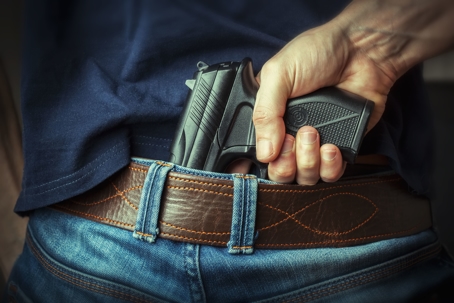Imagine yourself walking down a street in New Orleans, enjoying the vibrant atmosphere. Suddenly, someone grabs your purse. Fear surges through you. What can you do to protect yourself? This is where self-defense laws come into play. Louisiana, like many states, has specific laws outlining your rights to use force in such situations. This blog post dives deep into Louisiana’s Stand Your Ground laws, explaining what they entail, when they apply, and the important distinctions between these laws and the Castle Doctrine.
The Legal Framework: Self-Defense in Louisiana
This Article Includes
Louisiana law (RS 14:20) recognizes the concept of justifiable homicide. This means you can use deadly force under certain circumstances without facing criminal charges. However, the law requires you to have a reasonable belief that you are in imminent danger of losing your life or receiving great bodily harm. Traditionally, most states required a person to retreat from a dangerous situation before using force. However, Louisiana’s Stand Your Ground law removes this duty to retreat in specific situations.
Stand Your Ground vs. Castle Doctrine: Key Differences
Both Stand Your Ground and the Castle Doctrine empower individuals to defend themselves. However, it’s crucial to understand the crucial differences in their application. The Castle Doctrine, a legal principle recognized nationwide, grants you the right to use deadly force to defend your home (habitation) against intruders. Even without Stand Your Ground laws, Louisiana, like most states, upholds the Castle Doctrine.
Louisiana’s Stand Your Ground law (RS 14:19) expands upon the Castle Doctrine by allowing the use of deadly force in self-defense beyond your home. This means you can potentially use deadly force to defend yourself in your car, at your workplace, or anywhere you have a legal right to be, as long as the conditions for justifiable homicide are met.
When Can You Use Deadly Force Under Louisiana’s Stand Your Ground Law?
Louisiana’s Stand Your Ground law allows the use of deadly force when you have a reasonable belief that you are in imminent danger of:
- Losing your life
- Receiving great bodily harm
The law applies in the following locations where you have a legal right to be:
- Your home (also covered under the Castle Doctrine)
- Your vehicle
- Your workplace
Important Considerations and Limitations
It’s vital to understand that Stand Your Ground does not grant you a license to kill. The law emphasizes the reasonableness of your actions. You must have a reasonable belief in the threat and the necessity of using deadly force. Here are some situations where Stand Your Ground may not apply:
- The initial aggressor: If you initiated the confrontation or used excessive force yourself, Stand Your Ground likely won’t protect you.
- Criminal activity: If you were involved in criminal activity at the time of the incident (e.g., a drug deal gone wrong), Stand Your Ground likely won’t apply.
- Subsided threat: If the threat has disappeared, and you are no longer in danger, using deadly force is no longer justified.
Case Examples (City Specific)
Let’s look at some real-world examples (without disclosing sensitive details) of how Louisiana courts have interpreted Stand Your Ground laws:
- In a 2018 case from Baton Rouge, a homeowner shot and killed a burglar who had broken into his residence. The court ruled the homeowner acted in self-defense under the Castle Doctrine.
- In a 2020 case from New Orleans, a motorist shot another driver during a road rage incident. The court determined the motorist did not have a reasonable fear of imminent danger, and Stand Your Ground did not apply.
These are just a few examples, and every case is unique, depending on the specific circumstances.
Seeking Legal Counsel
Navigating self-defense situations, especially those involving deadly force, is complex. Legal advice is crucial. A lawyer can help you understand your rights under Louisiana’s Stand Your Ground laws, assess the specific details of your situation, and represent you if you face legal charges.
Conclusion
Understanding Louisiana’s Stand Your Ground laws empowers you to protect yourself in dangerous situations. However, remember these laws have limitations, and using deadly force should always be a last resort. If you face a self-defense situation, consult with a lawyer immediately. It’s also important to be aware of your surroundings and prioritize de-escalation whenever possible.










